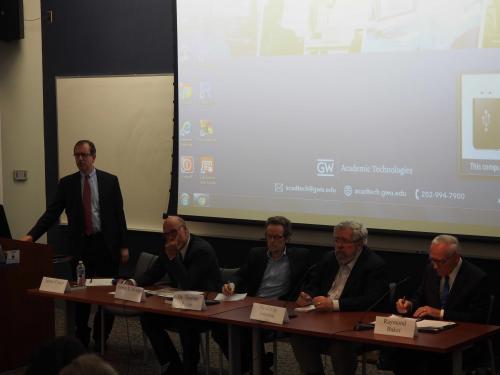
GJP Fellow, Matti Ylönen, reports on the event ‘The Night Before Taxes’, April 14th 2016, Washington D.C.
As tax justice issues are gaining ground in the international policy agenda, last week saw a publication of the new book, Global Tax Fairness, focusing on its key initiatives.‘We are now at the point where more than 50% of the global wealth is owned by 1% of the human population, as Oxfam has reminded us’, said Professor Thomas Pogge in his opening remarks in a panel organized for the book launch at the Elliott School of International Affairs in Washington D.C.
This inequality is partly driven by the world of tax havens and international tax avoidance. ‘When the tax system gets corrupted, the basic functions of taxes are undermined’, Pogge stated. The new book is edited by Pogge together with Krishen Mehta, who is among other things a fellow at the Yale’s Global Justice Program and a former partner at the PriceWaterhouseCoopers auditing and tax advisory firm.
‘Our primary goal was to gather the best experts around the world with the most interesting initiatives and write chapters on each one of those initiative’, Pogge continued.
The perfect storm in Panama?
While academic books typically lag several years behind the international policy agenda, Global Tax Fairness could hardly be more topical than is it now, right after the Panama papers information leak. The issue raised a lot of interest in the two panel discussions.
‘We need to remember that the Panama papers was a leak from just from one Panamaian law firm’, stated James S. Henry in the first panel after pointing out how a large number of accounts at large banks had been opened with the help of a single Panamaian firm. Henry is an economist, attorney, investigative journalist and a senior adviser for the Tax Justice Network.
Raymond Baker from Global Financial Integrity went over the long history of tax havens and international offshore finance, and also saw the Panama papers as a one step in a long game. ‘I don’t see the Panama papers as a definite game changer’, he maintained. The Panama papers have in any case highlighted several deficiencies in global tax governance, many of which hurt also developing country efforts for domestic resource mobilization.
Moreover, several panelists highlighted how the secrecy jurisdictions (or tax havens) are not only a tax issue. While they do play a key role in corporate profit shifting and tax evasion by investors, the opaque structures create various other problems at well. These include — but are not limited to — growing international and national income inequalities, distortion of statistics of world trade and investment, and unfair competition between smaller and bigger players in the markets
Where is the next generation of tax justice advocates?
One of the most anticipated panelists in the event was Ralph Nader, who drafted his own corporate code of conduct already in 1976 in his co-authored book Taming the Giant Corporation. Nader asked the panelists the provocative question of where their can successors be found. Many answers were optimistic. Other panelists pointed out how the United States is currently seeing a major grassroots level mobilization as younger people have become more interested in social justice issues. Many of these people are also interested and highly knowledgeable on tax issues as well.
Altering a phrase made famous by philosopher Hannah Arendt, Nader also warned about the ‘banality of exposés’
‘If more exposes keep appearing, people no longer know what to do with them’, Nader argued.
However, other panelists pointed out the political developments around many key initiatives aimed at plugging the loopholes in the current patched tax governance network. If the exposes succeed in keeping up momentum for fixing these problems, they can be highly productive also in the future.
